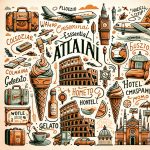Are you planning a trip to Italy? Whether it’s for a short visit or an extended stay, learning some basic Italian phrases can greatly enhance your travel experience. In this article, we will delve into the importance of learning Italian phrases for travel and how it can help you better communicate with locals and immerse yourself in the culture.
When traveling to a foreign country, having even just a few key phrases in the local language can make a world of difference. It shows respect for the local culture and people, and opens doors to authentic experiences that may otherwise be missed. By speaking some Italian, you not only make your interactions smoother but also demonstrate your willingness to engage with the locals on a deeper level.
Learning basic Italian greetings such as “ciao” (hello) and “buongiorno” (good morning/afternoon) is a great starting point. It allows you to easily connect with Italians wherever you go. Additionally, being able to introduce yourself and ask someone’s name fosters immediate connections and shows interest in others. Basic phrases for expressing politeness like “please” (per favore) and “thank you” (grazie) are essential for showing gratitude and making positive impressions during your travels.
So, whether it’s navigating transportation, dining at local restaurants, shopping for souvenirs, or seeking help during emergencies – knowing some basic Italian phrases can transform your trip into an immersive and meaningful experience. In the following sections of this article, we will explore specific categories of important Italian phrases for travel that will equip you with the necessary language skills to navigate various aspects of your journey. Let’s dive in.
Greetings and Essentials
When traveling to Italy, it is essential to familiarize yourself with basic Italian greetings and essential phrases. Learning these phrases not only allows you to communicate effectively with locals but also helps you immerse yourself in the culture and gain a deeper understanding of the destination.
One of the most common greetings in Italian is “ciao,” which can be used both informally and formally to say hello or goodbye. Another important phrase is “buongiorno,” which means good morning or good day, and is commonly used as a polite greeting.
In addition to greetings, it’s important to know how to introduce yourself and ask someone’s name. To introduce yourself, you can say “mi chiamo” followed by your name. If you want to ask someone’s name, you can use the phrase “come ti chiami?” which means “what’s your name?”.
Politeness is highly valued in Italian culture, so it’s crucial to learn basic phrases for expressing politeness. Saying “per favore” means please, while “grazie” means thank you. Using these two phrases frequently during your interactions will show respect towards the locals and make your experience more enjoyable.
By mastering these greetings and essential phrases, you will be able to navigate through various social situations more confidently during your travels in Italy. Whether it’s starting a conversation with a local or asking for directions, these basic phrases lay the foundation for effective communication and help create memorable experiences.
Navigating Transportation
Italy is known for its efficient and extensive public transportation system, making it relatively easy to travel within the country. However, if you don’t speak Italian, navigating transportation and asking for directions can be challenging. In this section, we will cover some key phrases that will help you find your way around airports, train stations, and bus stops.
Finding Your Way
When arriving at an airport or train station, it is important to know how to ask for directions. You can use the phrase “Scusi, dove si trova ” which means “Excuse me, where is “. For example, if you are looking for the ticket office, you can say “Scusi, dove si trova l’ufficio dei biglietti?”.
Additionally, knowing basic vocabulary related to transportation modes will be useful. Words such as “treno” (train), “aeroporto” (airport), and “autobus” (bus) will come in handy when asking for directions or purchasing tickets.
Asking for Help
In case you get lost or need assistance during your travels in Italy, it is important to know how to ask for help. The phrase “Ho bisogno di aiuto” means “I need help”.
If you find yourself in an emergency situation or witness an accident, you should be able to communicate effectively with the locals or authorities. Knowing key vocabulary words related to emergencies such as “medico” (doctor), “pompieri” (firefighters), and “polizia” (police) can be crucial in seeking the necessary help.
Ticketing and Fare
Understanding how ticketing systems work and being able to ask simple questions about fares will make your journey more smooth and enjoyable. When purchasing a ticket at a train station or bus stop, you can ask “Quanto costa?” which means “How much does it cost?” and “Dove posso comprare un biglietto?”
which means “Where can I buy a ticket?”. Additionally, it is important to know basic vocabulary related to tickets, such as “biglietto” (ticket), “andata” (one-way), and “ritorno” (return). By familiarizing yourself with these phrases and vocabulary, you will be better prepared to navigate transportation in Italy.
With these essential Italian phrases for navigating transportation in mind, you will enhance your travel experience in Italy. From finding your way at airports and train stations to asking for help in emergencies or understanding ticketing systems, learning these phrases will enable you to communicate more effectively with locals and make the most of your trip. So, practice these phrases before your journey and embrace the adventure of exploring Italy’s beautiful cities and landscapes. Buon viaggio.
Dining and Food
When traveling to Italy, one of the highlights is undoubtedly experiencing the delicious cuisine. To fully immerse yourself in the dining culture, it is important to learn some essential Italian phrases related to dining and food.
1. Ordering food and drinks:
- May I have the menu, please? – Mi può portare il menu, per favore?
- I would like – Vorrei
- A table for two, please. – Un tavolo per due, per favore.
- What do you recommend? – Cosa mi consiglia?
2. Dietary requirements and preferences:
- I am vegetarian/vegan. – Sono vegetariano/vegano.
- Does this dish contain nuts/dairy/gluten? – Questo piatto contiene noci/latticini/glutine?
- I cannot eat seafood/meat/pork. – Non posso mangiare frutti di mare/carne/maiale.
3. Interacting with waitstaff:
- Excuse me – Mi scusi
- Can we have the bill, please? – Possiamo avere il conto, per favore?
- The service was excellent. – Il servizio è stato eccellente.
Understanding the menu can be a challenge when traveling to a foreign country. Familiarizing yourself with common Italian food terms can help you choose dishes that suit your preferences. Here are some useful vocabulary words:
- Primi piatti: First courses or pasta dishes
- Secondi piatti: Second courses or main dishes
- Antipasti: Appetizers or starters
- Dolci: Desserts
- Vino: Wine Finally, don’t hesitate to ask for recommendations from the waitstaff. They are often eager to suggest popular local dishes or specialties. Exploring the authentic flavors of Italy and trying new culinary experiences can truly enhance your travel experience.
By learning these dining and food phrases in Italian, you will not only be able to order delicious meals with confidence but also connect with locals on a deeper level. Embrace the opportunity to explore the local cuisine and make lasting memories during your visit to Italy.
Shopping and Negotiating Prices
Basic Phrases for Shopping
When traveling to Italy, shopping is often a popular activity among tourists. Whether you’re browsing through markets or exploring local stores, knowing some basic Italian phrases will be extremely useful. To start off, “Quanto costa?” (How much does it cost?)
is a fundamental phrase that can be used when asking for prices. Additionally, it’s helpful to know how to say “I would like” (“Vorrei”) and “I’m just looking” (“Sto solo guardando”) when interacting with shopkeepers. These phrases allow you to express your preferences and intentions while shopping.
Negotiating Prices
In many markets and small shops in Italy, bargaining is a common practice. It’s important not to be afraid to negotiate the price, as it is an expected part of the shopping experience. When it comes to negotiating prices, using polite phrases can go a long way in building rapport with the seller. Phrases such as “Possiamo fare uno sconto?”
(Can we have a discount?) and “È troppo caro” (It’s too expensive) can help initiate a discussion about adjusting the price. Remember to maintain a friendly tone and be respectful throughout the negotiation process.
Vocabulary for Shopping
Being familiar with certain vocabulary related to shopping can enhance your overall experience when browsing Italian stores or markets. Some useful words include:
– “Abbigliamento” (clothing)
– “Souvenir” (souvenir)
– “Borsa” (bag)
– “Orologio” (watch)
– “Ciondolo” (pendant)
Knowing these terms will enable you to better understand and communicate when making purchases or asking questions about specific items.
Overall, mastering basic phrases for shopping and negotiating prices in Italian will greatly benefit your travel experience in Italy. It allows you to engage with locals, immerse yourself in the culture, and potentially secure better deals while shopping. So, don’t forget to practice these phrases before your trip and embrace the authentic shopping experiences that Italy has to offer.
Emergency Situations
In emergency situations while traveling in Italy, it is crucial to be prepared and able to seek help or assistance. Knowing some essential phrases in Italian can make a significant difference in these critical situations. This section will provide you with useful phrases and vocabulary for emergencies, medical concerns, accidents, and reporting incidents.
When faced with an emergency, being able to ask for help or contact the authorities is of utmost importance. Here are some key phrases to remember:
- Aiuto. (Help).
- Ho bisogno di aiuto. (I need help).
- Chiamate un’ambulanza/polizia. (Call an ambulance/police).
- Sto male/ho mal di (insert body part) (I am not feeling well/I have pain in my ).
It is also important to know how to describe your medical condition or accident:
- Sono allergico/a a (insert allergen) (I am allergic to ).
- Mi sono fatto/a male alla testa/gambe/braccia/stomaco (I hurt my head/legs/arms/stomach ).
- Ho perso il mio passaporto/portafoglio/sacchetto (I have lost my passport/wallet/bag ).
| English | Italian |
|---|---|
| Hospital | Ospedale |
| Doctor | Medico/Dottore/Dottoressa |
| Pharmacy | Farmacia |
| Pain | Dolore |
| Accident | Incidente |
| Lost/stolen | Perso/rubato |
| Emergency phone number | Numero di emergenza |
Being prepared for emergencies and having the ability to communicate your needs in Italian can alleviate stress and ensure a safe outcome. Remember to keep important contact numbers, such as local emergency services and embassy, readily accessible.
Social Interactions and Small Talk
In the bustling streets of Italy, connecting with locals and engaging in small talk can add a whole new dimension to your travel experience. Learning some key Italian phrases for social interactions can help you break the ice, make new friends, and gain insights into the local culture.
Whether you are exploring the charming cafes of Rome or strolling through the picturesque streets of Florence, here are some essential phrases to help you navigate social interactions and engage in small talk with locals.
To start a conversation, a simple “Ciao” (pronounced chow) is a friendly and casual way to greet someone. It is an all-purpose greeting that can be used throughout the day. If you want to be more formal, especially when meeting someone for the first time, use “Buongiorno” (pronounced bwon-jor-no), which means “good day” or “good morning.”
You can follow up with “Come stai?” (pronounced koh-meh sty-eye), which means “How are you?” This shows genuine interest in the person’s well-being and opens up opportunities for further conversation.
When engaging in small talk, Italians appreciate discussing topics such as food, art, sports, or local culture. An effective way to initiate conversation about these subjects is by asking questions using phrases like “Che cosa ti piace fare nel tempo libero?” (pronounced keh koh-sah tee pee-ah-cheh dah-reh n-el tem-poh leh-b-ro), which means “What do you like to do in your free time?”
or “Qual è il tuo cibo italiano preferito?” (pronounced kwahl eh eel too-oh chee-bo ee-ta-lee-ah-no preh-feh-ree-to), which means “What is your favorite Italian food? “.
Italians also value politeness and demonstrate it by showing interest in others. Two common phrases that can convey your respect are “Mi scusi” (pronounced mee skoo-zee), meaning “Excuse me,” and “Permesso” (pronounced per-mes-so), meaning “May I?” These phrases are useful when trying to approach someone or ask for assistance. Remember to use these expressions with a friendly tone and a smile, as they help create positive social interactions.
By taking the time to learn these key phrases for social interactions and small talk, you will be able to forge deeper connections with locals and gain a more immersive cultural experience during your travels in Italy. So, put your language skills to the test, strike up conversations with Italians, and embrace the vibrant world of socializing and making friends while exploring this beautiful country.
Sightseeing and Tourist Attractions
When exploring a new country, visiting its famous tourist attractions is often high on the list. To fully enjoy these experiences in Italy, it’s useful to learn some key Italian phrases that will help you navigate sightseeing destinations with ease. Whether you want to ask for information, purchase tickets, or simply appreciate the beauty around you, these phrases will enhance your visit.
One of the first things you may need to do when visiting a tourist attraction is to obtain information or ask questions. Here are some phrases that will come in handy:
– “Dov’è il biglietto?” (Where is the ticket?)
– “Quanto costa l’ingresso?” (How much does the entrance cost?)
– “Ci sono visite guidate?” (Are there guided tours?)
– “Cosa posso vedere qui?” (What can I see here?)
To purchase tickets or gain entry to an attraction, use these phrases:
– “Vorrei due biglietti per ” (I would like two tickets for ).
– “Posso avere uno sconto per studenti?” (Can I have a student discount?)
– “A che ora inizia la visita?” (What time does the tour start?)
When describing what you see or expressing your admiration, try using these common vocabulary words:
– “‘Un monumento” (a monument)
– “‘Un affresco” (a fresco)
– “‘Una statua” (a statue)
Learning and using these phrases will not only help you gain a deeper appreciation of Italy’s rich culture and history but will also make interactions with locals more enjoyable. By engaging in conversations and asking questions about the sights you’re visiting, you’ll be able to connect on a deeper level and create meaningful memories during your travels.
| Italian Phrase | English Translation |
|---|---|
| Dov’è il biglietto? | Where is the ticket? |
| Vorrei due biglietti per | I would like two tickets for |
| A che ora inizia la visita? | What time does the tour start? |
Conclusion
In conclusion, learning basic Italian phrases for travel can greatly enhance your overall experience in Italy. Whether you are navigating transportation, dining at local restaurants, shopping for souvenirs, or engaging in social interactions, being able to communicate with locals in their native language will make your interactions more meaningful and immersive. By mastering essential greetings and expressions of politeness, you will be able to establish a friendly connection with the people you encounter.
Additionally, knowing key phrases for navigating transportation systems such as airports, train stations, and bus stops will help you confidently find your way around the country. Understanding how to ask for directions and purchase tickets will save you time and ensure a smooth journey. Furthermore, being able to order food and drinks at restaurants, cafes, and bars will enable you to explore the rich culinary traditions of Italy and indulge in local specialties.
As you explore different cities and regions in Italy, being familiar with basic shopping phrases will allow you to interact with local vendors and negotiate prices with confidence. This not only adds an element of fun to the shopping experience but also allows you to enjoy the process of finding unique souvenirs or pieces of clothing that suit your taste.
Moreover, by learning phrases related to emergency situations and seeking assistance, you can ensure your safety throughout your travel journey. Knowing how to communicate any medical concerns or report incidents accurately is crucial for timely help and resolution.
Overall, embracing Italian phrases during your travel experience not only facilitates practical communication but also shows respect for the culture and helps build connections with locals. So set aside some time before your trip to practice these phrases so that you can fully immerse yourself in all that Italy has to offer. Buon viaggio.
Frequently Asked Questions
How to learn Italian phrases for travel?
Learning Italian phrases for travel can be done through various methods. One effective way is to invest in a good phrasebook or language learning app that is specifically focused on travel phrases. These resources typically include common phrases and expressions that are useful for navigating different situations while abroad, such as asking for directions, ordering food, or checking into a hotel.
Additionally, engaging in online language courses or finding a language exchange partner who speaks Italian can enhance your learning process. Practicing regularly and immersing yourself in the language by watching Italian movies or listening to Italian music will also help familiarize you with the pronunciation and context of the phrases.
What are popular Italian phrases?
There are several popular Italian phrases that travelers may find helpful during their trip. “Buongiorno” is a commonly used greeting that means “good morning” or “good day.” “Grazie” which means “thank you,” can be used to express gratitude in various situations.
Another important phrase is “scusi,” meaning “excuse me” or “sorry,” which can come in handy when trying to get someone’s attention or apologizing for an accidental bump. When saying goodbye, Italians often use “arrivederci” which translates to “goodbye” but also implies the hope of seeing each other again. Lastly, if you’re enjoying your meal at a restaurant, it’s customary to say “buon appetito” before starting; this phrase wishes everyone around you a good meal.
What do Italians say instead of Bon Voyage?
Instead of using the phrase Bon Voyage, Italians commonly say “Buon viaggio.” This expression directly translates to “good journey.” It is polite and considered more appropriate when bidding farewell to someone embarking on a trip.
Italians also use variations such as “(Hai un) buon viaggio verso il tuo destino,” which means “(Have a) good journey towards your destination.” It is noteworthy that while Bon Voyage has become known internationally due to its association with travel, it is not typically used in Italian conversation and Buon viaggio is the preferred alternative.

I’m a passionate traveler, writer, and Italophile. My fascination with Italy’s history, art, and culture has led me on countless adventures across the Italian landscape. Through “I Live Italy,” I share my love for this extraordinary country and aims to inspire others to explore its boundless beauty.





